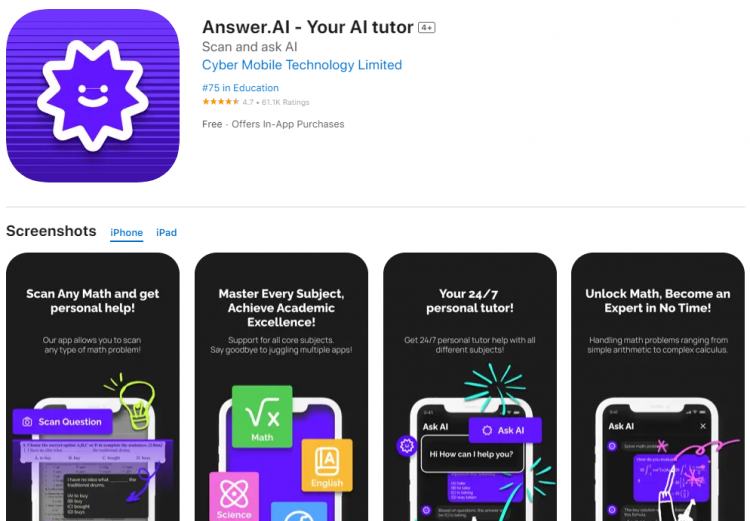The rise of AI technology is creating new opportunities for Chinese companies to expand internationally, particularly in the realm of homework assistance. With extensive databases and large language models (LLMs) developed over years, Chinese enterprises are making significant inroads into the U.S. market, challenging traditional human tutors.
Today, when American students struggle with complex calculus problems, they can turn to apps like Answer AI, Question AI, and Gauth. By simply taking a photo of the problem with their phone, they can receive step-by-step solutions within seconds. Notably, all these applications are developed by Chinese companies.
According to media reports, a year ago, Evan, a high school student from Houston, relied on lengthy YouTube videos to solve his homework problems and paid $60 per hour for tutoring. He soon discovered that a yearly subscription to Answer AI cost about the same, leading him to drop his tutor and rely almost entirely on AI for homework help.
Data from Data.ai on May 21 shows that five of the top 20 educational apps on the U.S. App Store are AI applications designed to help students with their schoolwork, including Answer AI. This app's founding team previously worked at Xiaomi and ByteDance. Other popular homework assistance apps, Question AI and Gauth, were developed by Zuoyebang and ByteDance, respectively.
According to market research firm SensorTower, Question AI has been downloaded 6 million times on the Apple App Store and Google Play Store in the U.S. since its launch in 2019, while Gauth has twice as many installations since its release.
Ric Zhou, founder of Answer AI, told the media that the advantages of AI tutoring are clear. It democratizes education by making high-quality assistance affordable. In Houston, tutoring services cost $60 per hour, which is significantly cheaper than in the Bay Area, where prices can be three times higher.
Zhou also highlighted that AI can offer more personalized teaching, a challenge in classrooms with 20 students. AI tutors can remember students' learning habits and provide patient, consistent responses, effectively replacing private tutors for wealthy families.
A high school junior from Houston reported that her math grades improved from 85 to 95 within six months of using AI-assisted learning.
Currently, most AI tutors operate through text-based interactions, but advancements are on the horizon. Soon, these tutors will be able to engage in conversations tailored to each student's learning style, displaying empathy, humor, and creativity. OpenAI's GPT-4o has already demonstrated the potential for AI assistants capable of conversing in various tones and styles with students.
Chinese companies have a competitive edge due to their extensive experience in the online education market and their massive question databases. For example, Answer AI uses Retrieval-Augmented Generation (RAG) to enhance response accuracy and avoid errors, leveraging domain-specific knowledge from their vast databases to fine-tune LLMs. Established companies like Zuoyebang combine generative AI with database searches to improve accuracy, forcing newcomers to innovate further.
Ric Zhou emphasized that AI agents must proactively engage with students and tailor responses to individual learning needs. "A raw language model is not a ready-to-use AI agent," he said. "We aim to differentiate by fine-tuning AI to teach more effectively. Our AI bots invite students to ask follow-up questions, encouraging deeper learning rather than merely copying results."






